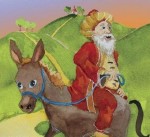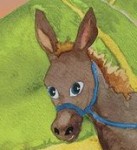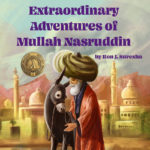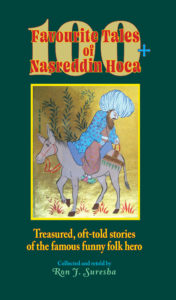Times were tough. Unemployment was skyrocketing, and the economy was in the pits. “I cannot find a job,” declared the Mullah, “as I am already employed full-time in the service of the All-Highest.”
“In that case,” said Fatima, “you should ask for your wages, because every employer must pay.”

Mullah Nasruddin
“That makes uncommon sense,” said Nasruddin. “Perhaps I have never been paid because I have never bothered to request a fee.”
“Then you had better go and ask,” said Fatima.
Nasruddin went into the garden and knelt, and cried out in supplication, “O Allah, this is your devoted servant Nasruddin here. Send me exactly one hundred — no fewer or more, please — gold coins, for all my past services are worth at least that much in back pay.”
Nasruddin’s neighbor, Aslan, a wealthy merchant whose yard adjoined the Nasruddin household, overheard Nasruddin’s plaintive demands for back wages owed, and thought he’d teach Nasruddin a lesson.
While Nasruddin continued imploring Allah for his back wages in the exact amount of one hundred gold coins, Aslan went up to his private chambers where he kept his money, counted out exactly 99 gold coins into a bag. Then he quickly crept out to the roof of his house. Just as Nasruddin’s head was bent to the ground, Aslan threw the bag from his window into the next yard, knocking the turban right off Nasruddin’s balding head, landing with a pleasant clinking thud onto Nasruddin’s prayer rug. Then Aslan quickly crept down to stand at the latticed window in his wife’s room, where he could observe Nasruddin’s reaction undetected.
Nasruddin gasped in surprise, then looked skyward in curious and hopeful anticipation. Without offering so much as a word of thanks to Allah, Nasruddin emptied the bag onto his prayer rug and counted the coins, then recounted them. He couldn’t seem to believe the result he was getting.
Aslan had to stifle his laughter at Nasruddin’s puzzlement as he crept away from the window, thinking that he’d keep poor old Nasruddin in the dark for a couple days before he let him in on the joke.
Finally Nasruddin announced, “You can owe me the last one.” He rolled up his prayer rug, and took his newfound earnings inside.
Nasruddin sat down across from Fatima, then said, “I am one of the saints.” He tossed the bag of gold coins on the table saying, “Here are my arrears.”
Fatima was indeed quite impressed.
Presently, made suspicious by the succession of deliveries of food, clothing, and furniture to Nasruddin’s front gate, Aslan went to claim the gold coins were his.
Nasruddin said, “You heard me calling for it and now you are pretending it is yours. You shall never have it, as payday has been long overdue me.”
Aslan said, “Then we must immediately go to court of summary jurisdiction to have the cadi settle this dispute.”
“I cannot go like this. I have a rip in my cloak that Fatima has to mend. If you sue me and we appear in court together and you are dressed so much better than me, the magistrate will be prejudiced in your favor.”
“All right,” Aslan said, “I’ll lend you a proper robe you can wear to court.”
“Also, my donkey’s leg is lame,” said Nasruddin, “and so I’ll also need to borrow a horse, saddle, and bridle, if you don’t mind.” Impatiently, Aslan got Nasruddin properly mounted onto one of his own horses and the two men rode to court.
Aslan brought his suit before Bekri the judge, “The 99 gold coins in Nasruddin’s possession are mine, your honor.”
Nasruddin asked to approach the bench, then pleaded his case in a whisper directly to the judge. “This man is clearly bonkers. For some strange reason, he thinks everything of mine is automatically his.”
“That’s quite a counterclaim,” said the judge. “What evidence of this do you have, Nasruddin?”
“His very own words will betray him!” Nasruddin asserted. “Not only does he claim that my gold is his, he will even say this cloak is his.”
“That robe is mine!”
Nasruddin leaned in even closer, saying, “It’s really quite pathological. Now, watch this rascal, next he will say that my horse is his, as well.”
“Bur your Honor! That is my horse!”
“Pitiful, pained, and petty,” Nasruddin continued, “you can see how troubled he is. Listen: he will claim that even my horse’s bridle is his.”
“B-b-but that bridle is mine!” cried Aslan, who broke down into hysterical sobbing.
“Order in the court!” called the judge, banging his gavel. “I rule in favor of Nasruddin. Case dismissed.”
Another longer, popular story of Nasreddin Hoca, his wife, neighbor, and the local cadi. I especially like the line, “You can owe me the last one.”
One night, Nasruddin awoke, slipped his feet into his pointy slippers and walked out of the bedroom. He lit a lamp and started to make a lot of clatter in the kitchen, which woke Fatima. She said, “What are you making such a racket for?”
 Your Daily Nasruddin
Your Daily Nasruddin 






Poisoned Baklava
Poisoned Baklava
In this famous story, young Nasruddin cannot resist his urge to eat his teacher’s baklava, so he bravely tastes the poisoned sweetmeat — seeming reckless and dangerous to his gullible classmates.
Of course the baklava isn’t poisoned. The whole class saw the parents offering the pan to the teacher. And heard Halil lie about it as if they hadn’t all already seen this, simply to scare the class from eating any.
But Nasruddin steps forward as the class leader and shows his friends there is nothing to fear. In fact, the truth is so sweet.
Some versions close the story with Nasruddin asking Halil why he hasn’t died from poisoning, but several have Halil foiling the boy’s victory by demanding his class assignment. Which ending makes the best sense to you?